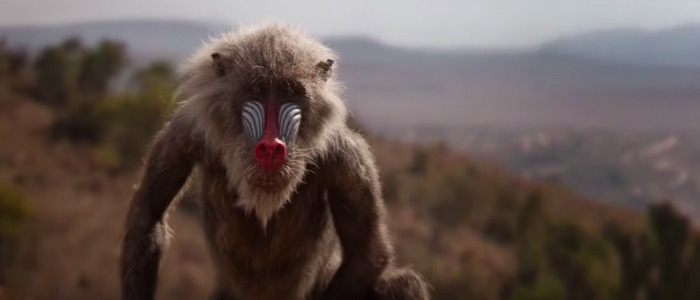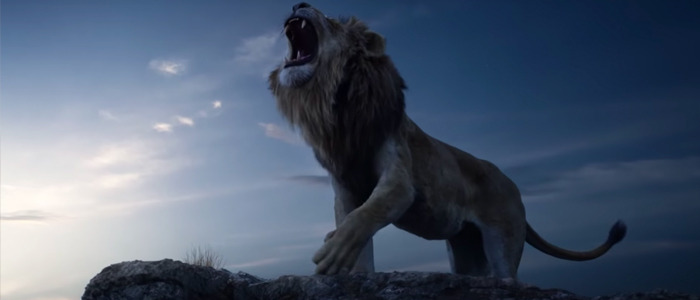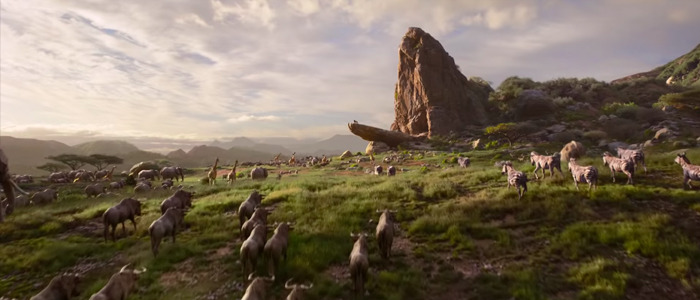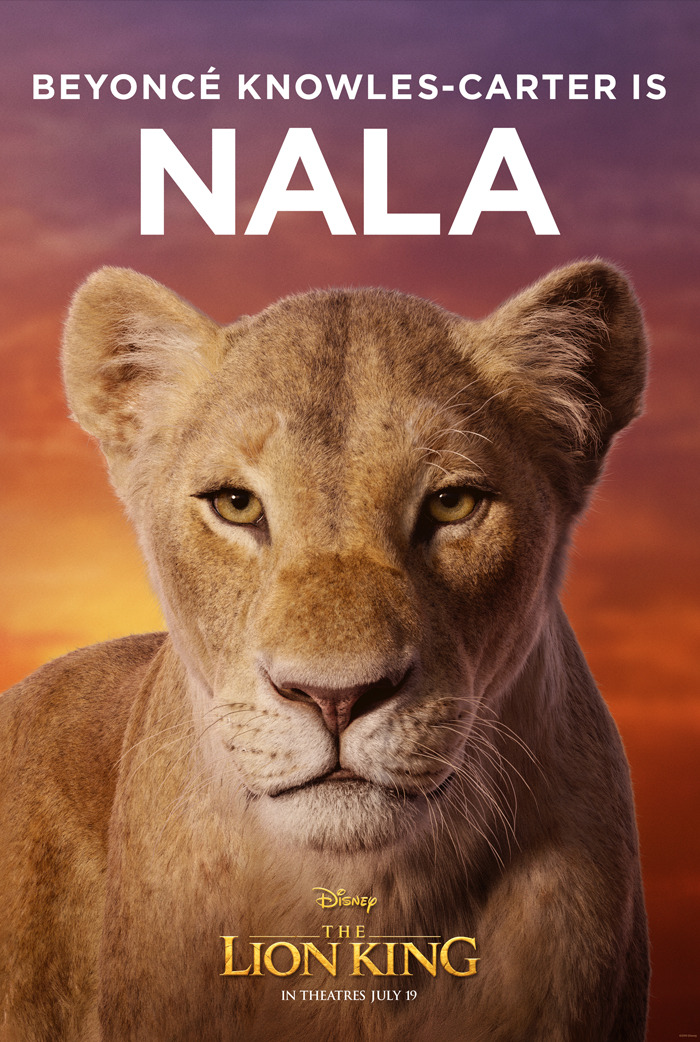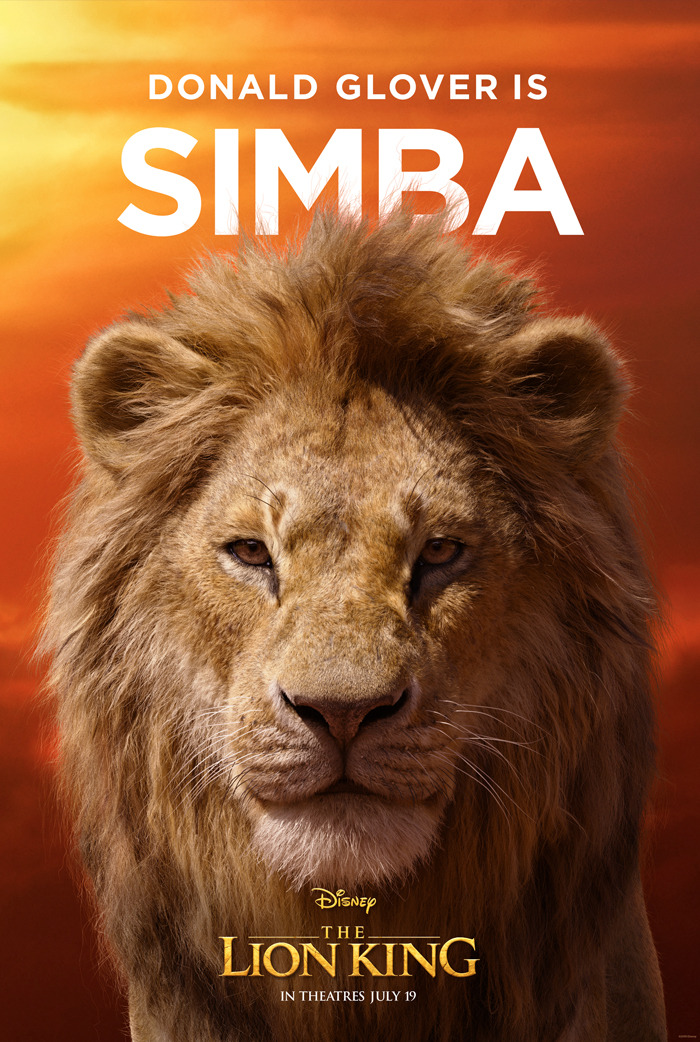'The Lion King' Director Jon Favreau On Giving His Version A Documentary Feel, The Challenges Of Expectations, And Much More [Set Visit Interview]
In December 2017, I drove to Playa Vista, California to visit the set of Disney's The Lion King. Our full set visit report is still under embargo for now, but we are allowed to publish our conversation with director Jon Favreau, who joined our small group of journalists for an extended interview.
Much of the set visit was spent discussing the technical aspects of how the film was coming together, but this talk with Favreau is a bit more personal. He explained why he wanted to make this movie (despite the fact that the animated original "still holds up really, really well"), what speaks to him about this story, crafting the tone of the movie, how different this is from the animated version, this film's music, and why he cast Donald Glover and Beyonce in the lead roles. Read the highlights of our Jon Favreau interview below.
Naturalism, And Favreau’s Reason For Making This Movie
Much of the work of filming The Lion King was done in virtual reality, with Favreau and collaborators like cinematographer Caleb Deschanel donning headsets, scouting digital locations for the perfect shot, and filming scenes with loosely rendered animated characters in the virtual world before sending them off to be finalized by the visual effects vendors. (We'll detail exactly how that process works in our full set visit piece, so keep an eye out for that.) Favreau, who comes from a traditional filmmaking background, spent much of the shoot chasing moments that felt natural and almost accidental, as opposed to shots that were perfectly crafted.
"What we're trying to do is, just like motion capture tries to get anomalies of performance, what we're trying to get is anomalies of photography," he said. "So if Caleb is communicating to someone operating a crane or a dolly, there's going to be a little bit of an interplay, almost like musicians working together, where the dolly might move too fast, or faster in one take. So we have to back pan a little bit, or a happy accident happens. And all those little subtleties actually – it's not anything I think anyone would notice consciously, but between the quality of the rendering and the techniques we're using, it starts to hopefully feel like you're watching something that's not a visual effects production, but something where you're just looking into a world that's very realistic and emotionally feels as realistic as if you're watching live creatures.
"And that's kind of the trick here, because I don't think anybody wants to see another animated Lion King, because it still holds up really, really well. But what gave me some encouragement was the work we were able to do on Jungle Book. I saw it as a great opportunity to springboard, refine the tools, and do this process for this. But also, seeing the animated film and then seeing the stage production as being able to exist with very close storylines and with much of the same music, and of course different people playing the characters in the different medium, but they're not seen as redundant. People will go see the stage show, and they'll also see the movie, and you could love both of them and see them as two different things. The challenge here, and I think what we laid out for ourselves as a goal, is to create something that feels like a completely different medium than either of those two, and so it could stand as yet a third way of telling this story. And fortunately, the music's really emotional and strong and wonderful, and we have great singers here to reinterpret those songs, so that helps freshen it up a bit.
"And also, using these techniques and really making the visual effects department a creative partner from the inception allows us to present visual effects, I think, hopefully, in a way that you haven't seen it before. So, just the spectacle of it, of if we can present something that looks like a BBC documentary on top of telling the story, and having those two exist together. The little bits that we've seen of it feels really encouraging and exciting and fun, and it's nice to, whatever it is, twenty years later, tell a story that still feels very relevant and music that really holds up to a new generation and introduce kids to it. And take full advantage of what's available on the big screen and make a case for people to actually go to the movie theater. That's something else I think that wasn't part of the equation when I started in movies. But now you've got to convince people that they shouldn't sit home and watch the great television that's on, or the show they want to binge. It's like having a restaurant: if you've got good food at home, you better make [going out] an event."
What Speaks To Him About This Story
Though it has moments of humor and fun, The Lion King is not an overly joyous movie. It's complicated, with a mixture of light and darkness, and that balance is what attracted Favreau to telling this story in this medium.
"I want to highlight really what's in there from the original," he explained. "It's the whole circle of life. Bad things happen, good things happen. Not every scene in the movie is fun to watch. There's tragedy in it. But ultimately what I like about it is that somehow after that whole experience, you walk away feeling inspired and hopeful. Which is how I like my stories. Everybody's different – it depends where you put the comma. If you end after Mufasa dies, different movie. (laughs) But as I go through dialogue – and especially hearing James Earl Jones say the lines, because he is the one character that is in both films, ours and the old one – it's moving. It still gets me. And the music also has a lot of soulfulness in it. As we do the music, as the stage play did, we're really exploring further what the roots of the music are. And because there's just such a tremendous emotional power and spiritual impact to hearing the choir sing and there's something that feels very ancient and powerful to it. And that Hans [Zimmer] and Elton John and the whole team somehow tapped into this wonderful thing that when you hear it...Part of it, when we did that teaser [at the D23 Expo in 2017], it was like, as long as you have the sun coming up and you hear those first notes, I'm already leaning forward. And then we just have to make sure that everything we show either references the old film – memories for people who saw it and just cool images for people who never saw it."
Is This Film Animation or Live-Action?
One of the most jaw-dropping aspects of our set visit included a quick trip to a screening room, where they showed us a simple test shot of Rafiki, one of the movie's supporting characters, just sitting and looking at the camera. He didn't speak – he just breathed, blinked, and moved around a bit – but it was completely mesmerizing and totally indistinguishable from an actual nature documentary. The uncanny valley may not have been traversed when it comes to generating convincing humans on screen (cough, Grand Moff Tarkin, cough) but this test footage proved that the gap has been closed when it comes to creating believable, lifelike animals on screen.
When Favreau directed The Jungle Book in 2016, it was easy for media outlets to refer to it as "the live-action Jungle Book" because he did actually shoot live-action footage of actor Neel Sethi as Mowgli and incorporated that into digital environments. But this version of The Lion King doesn't have any live-action footage at all, so how should it be categorized? Even Favreau himself doesn't know the answer to that question.
"Well, it's difficult because it's neither, really. It depends what standard you're using. Because there's no real animals and there's no real cameras and there's not even any performance that's being captured that's underlying data that's real. Everything is coming through the hands of artists. But to say it's animated I think is misleading as far as what the expectations might be. And it also changes the way you sit and watch it. Because hopefully, you could just watch it without it being introduced. If we put up that Rafiki footage and didn't say what it was, some people might know, some people might not know how it was done, but it causes you to be present and mindful and pay attention because you're trying to figure out what you're looking at. And that's a great disposition to be in as an audience member.
"I remember when I saw Gravity, I didn't know what I was gonna expect, I just heard it was cool. I didn't know how they did half the tricks. And I was completely drawn in by it and it was the experience I remember going to the movies for when I was little. It just washes over you. I think calling it live-action is also not appropriate either, because it sounds like we're trying to present something that isn't accurate. And I don't know what we're gonna call it. I don't know. But remember, things have to sort of fit into one clickable headline, so it's hard to have the nuance."
Crafting The Tone
When I spoke with Favreau during press rounds for The Jungle Book, he told me that the reason he wanted to use CG effects for that project was to capture the dreamlike quality of the original film. But The Lion King animated movie doesn't have that sense of surreality, so I asked Favreau how that changed his approach for this version.
"I think because it's Africa, it's a different thing, and it's a different tone of the story, too," he replied. "This feels like myth. I think that's a part of it: creating a tone that feels consisting for this medium. Which you get away with other goofier humor – more violent stuff, too – because a cartoon kind of sands those edges down. With live action you have to be more decisive about things like humor and intensity and violence because it will get very extreme and not feel like part of the same film. So a lot of it is being a shepherd of the tone of it and the ride of it, and ultimately for you to walk out and you say, 'Yeah, that's what I remember about the old one.' And if you're thinking of introducing your kid to Lion King for the first time, that they're gonna be seeing Lion King if you bring them here. And then they'll want to go home and watch the cartoon and they'll want to go see the play or be in the play."
This Film’s Relationship To The Original
Favreau told us that while he obviously wants there to be a familiarity for audiences, he also saw opportunities to change some aspects here and there.
"The more we looked at it, the more we challenged the story, there were certain things that needed addressing to make it feel more appropriate to this medium. But as far as the characters, the story, the themes, the music, we really felt that people were very connected to the original, and so hopefully if you are a fan of the original you'll look at this and say, 'Oh, I feel like I saw Lion King.' Just like when you see the stage play, you still feel a connection to the animated film. But if you really look closely you'll realize we're actually taking a lot of liberties with it and we're even changing things slightly with scenes and structure and the humor."
But How Different Will It Be?
"It depends how well you know it. How much did we change in [the] 'Circle of Life' [sequence from the D23 footage]? Some of you might say, 'Oh, that's shot for shot,' but if we really look, it's not. What you remember is going to be in the movie, let's put it that way. That's something I learned on Jungle Book too, and even to some extent on Iron Man, which is like, before we study the old movie, let's write down everything we know and everything we remember. What are the things that we have to do? It's a much longer list on Lion King, because everybody watched it in the back of their minivans on DVD over and over again. The millennials grew up with this, and even I've seen it lots and I was an adult when it came out.
"So I think part of it's just understanding the way memory works, and then what expectations are and then being able to do things like, 'I think we can plus the humor here. I don't think this joke holds up as well. I think we could change the characterization of this character to feel more consistent with the rest of the film, or more current and doesn't feel like it's something from a different era.' And so a lot of it is that, and then of course with the music it's just like, 'Take it away. I know it sounds one way on the album, but if we could do it better at the concert, let's do that.' And so, seeing that we really have to blow people away with the music and with the effects and the visuals and the casting. And then, if we add a scene here or there or remove a song or remove the scene, make sure that it flows in and that it's something that makes it play better. But I'd say we were staying very, very close to what you think it's gonna be."
Will There Be New Songs In The Movie?
With actor/musicians like Donald Glover and Beyonce starring in this movie, one of the big questions on everyone's minds was whether or not we'd hear any new songs in this take on The Lion King. Favreau told us yes, but maybe not where we'd expect.
"Not in the body of the film, but once you get to the end of the movie and on, you've got thousands of credits and there's opportunity for lots of music and we have this incredible pool of talent. So as we get into next phase, we're starting to zero in on that. Fortunately, that takes very little time compared to what this takes, so as [production] starts to coalesce, we start to see what we want with the music. And also there's a lot of people that I'm working with that – I don't come from music, and they really know what they're doing, so hopefully that's all gonna come together in a way that [provides] a little more value added."
Working With Beyonce
"She's busy," the director laughed when asked about working with one of the world's biggest superstars. "She has babies, she has albums, she goes on tour, her husband goes on tour. So she's logistically trickier than some of the other cast members. Half of that role is singing, too, so that definitely made us feel that we had the right choice there. And then she had really prepared. She's a very hard worker, it's no surprise that she has had success in so many areas and if you look at Lemonade, you see really understands filmmaking, too, and is very curious and innovative. Once it finally became human scale and it was just us in the studio, she was great and she had even prepared a lot of the stuff ahead of time. This is a process, which is nice, because it really concentrates the time. She doesn't have to sit in a trailer waiting for a camera to be ready. When it's her, it's all about her and I get to focus on her performance and getting to know her and then I get to go off and work with the camera people. So it has informed it and I try to get to know my cast members and have what ultimately ends up in the animation and visuals reflect who they are. Even if it's not obvious on the surface, it definitely inspires me in the way I conceive it."
Working with Donald Glover
Near the end of our conversation during our 2017 set visit, Favreau relayed the story of how he got Donald Glover to come on board, what the two of them have in common, and why casting Glover early set the tone for the rest of the production.
"My son was a fan first from Childish Gambino, and then I was very impressed: the fact that he had worked his way through a writers room on 30 Rock, and that he was on Community. And he comes from the improv tradition, which is my background, too, so I was hoping to have a common language with him. Because you take scenes apart differently and you use different terms than you would than if you came out of Juilliard. You're coming from a comedy background, and it's a more, 'Bring your lunch pail and let's figure this out' [approach]. Your experience is, you're getting together and you're usually getting on stage in the back room of a bar and you're putting on an improv show, and you're expecting people – half of which probably didn't even know there was going to be a comedy show – and you gotta make them laugh. You bring in a different set of experiences when you work on a film set. And I like that feeling, that immediacy that comes from improv. And also the freedom to reinterpret material, and giving some freedom for the actor to collaborate, not just in their performance, but in the material and the lines. And then of course, his singing is astounding. I'd seen him, of course, in Atlanta, and then he was cast as Lando [in Solo: A Star Wars Story], but I was hoping that he'd still be available for this because I had my eye on him.
"I finally met him, we did a Hollywood Reporter roundtable a few award seasons ago. And I met him, he was very nice, he was everything I hoped he would be, just like you think seeing how he is on screen. And on a break, I said, 'Hey, look I haven't talked to Disney about this, I don't want to go through all of it now, is this something you might be interested in?' And he was like, 'Yeah, I would be interested!' And then from that point on I talked to Disney and they were into it too, and by that point, he was already part of the Star Wars universe. And then he started winning all these awards and that's always helpful trying to convince (laughs). But they were into him right from the beginning and he has a wonderful timbre to his voice, both singing and performing. You can see that he's just this creative beacon that has – he's already getting involved with animation, as well, on other projects that he's heading up. [Note: Glover's planned Deadpool animated series has since fallen apart at Marvel.] So he's just one of those special creative forces.
"[Audiences] are still trying to figure out what we're doing here, but casting is important – you're sending messages to the fans. And our first announcement was Donald Glover and James Earl Jones, and it kind of was a shorthand for how we're doing this. And then everything else is sort of built out from that. And when the response was people appreciated what we were doing, that they liked that choice, it lowered my blood pressure and I worried less. I felt more confident that we were going down the right road. Donald is very of this moment and creative and new and fresh, and then James Earl Jones, he really carries the tradition and his voice has so much character to it and it's so closely associated with Mufasa. And having them together is one foot in the future, one foot in the past. I think that's what the story is."
Working With Hans Zimmer, And The Challenges of Expectations
And finally, Favreau spoke to us about collaborating with composer Hans Zimmer (who is returning to score this project after scoring the original Lion King), how the iconic music is already ingrained in the population, and the challenges of living up to expectations.
"I know Hans had to use a lot of digital instruments, more than he would have wanted to," Favreau said of Zimmer's work on the animated original. "And here, we'll be able to give him another crack at that and see what he comes up with. He also has learned a lot from performing live and touring and how to bring some of that energy to it. He's very inspired as far as that goes. And then also having this wonderful wealth of vocal talent that they have met and learned through the various stage productions. So we're still in contact with, we're all in the team Lion King as it crosses multiple platforms and to be able to draw upon all that experience and all that talent and then get that to add impact to it...It's very hard to compete with something that's [positioned] so fondly in people's memories. Can you take that and amplify it? And I know I was watching him play, I was watching him do his live show, I think it was at the Shrine. Where he plays the score suites from each of his productions and he's got quite a collection, if you look 'em up. It's a lot of very iconic themes, and he would tell a little story in before any of them, all of them, about The Dark Knight, about Inception.
And there was one he didn't intro, and it was Lion King and Lebo came out and sang and it was the first opening phrase from 'Circle of Life' and the whole place just perked up and started to cheer because it's so ingrained in us. To have that already there, the emotional infrastructure there, it makes us know, if we do our jobs well, people are gonna connect with this. And I can't express enough as a filmmaker, how grateful I am for that. Because normally you don't walk in with that. There are challenges that come with expectations, but to know that in this world of distraction and everything going on, everybody's gonna look at you for that one second and then see and hang in there until you lose 'em is an interesting circumstance that you don't find yourself in."
The Lion King arrives in theaters on July 19, 2019.

